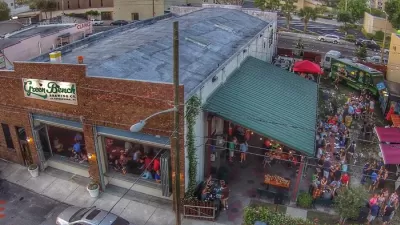Joel Kotkin thinks that the effects of the financial crisis may not be all bad, and may even encourage a new focus on family and community ties.
"This trend toward what I call "the new localism" has been underway for some years, driven by changing demographics, new technologies and rising energy prices. But the economic downturn will probably accelerate it as individuals and corporations look not to the global stage but closer to home, concentrating and congregating on the Main Streets where we choose to live – in the suburbs, in urban neighborhoods or in small towns.
In his 1972 bestseller, "A Nation of Strangers," social critic Vance Packard depicted the United States as "a society coming apart at the seams." He was only one in a long cavalcade of futurists who have envisioned an America of ever-increasing "spatial mobility" that would give rise to weaker families, childlessness and anonymous communities.
Packard and others may not have been far off for their time: In 1970, nearly 20 percent of Americans changed their place of residence every year. But by 2004, that figure had dropped to 14 percent, the lowest level since 1950. Americans born today are actually more likely to reside near their place of birth than those who lived in the 19th century. Part of this is due to our aging population, because older people are far less likely to move than those under 30. But more limited economic options may intensify this phenomenon while bringing a host of social, economic and environmental benefits in their wake."
FULL STORY: Turns Out There's Good News on Main St.

Alabama: Trump Terminates Settlements for Black Communities Harmed By Raw Sewage
Trump deemed the landmark civil rights agreement “illegal DEI and environmental justice policy.”

Study: Maui’s Plan to Convert Vacation Rentals to Long-Term Housing Could Cause Nearly $1 Billion Economic Loss
The plan would reduce visitor accommodation by 25% resulting in 1,900 jobs lost.

Planetizen Federal Action Tracker
A weekly monitor of how Trump’s orders and actions are impacting planners and planning in America.

Waymo Gets Permission to Map SF’s Market Street
If allowed to operate on the traffic-restricted street, Waymo’s autonomous taxis would have a leg up over ride-hailing competitors — and counter the city’s efforts to grow bike and pedestrian on the thoroughfare.

Parklet Symposium Highlights the Success of Shared Spaces
Parklets got a boost during the Covid-19 pandemic, when the concept was translated to outdoor dining programs that offered restaurants a lifeline during the shutdown.

Federal Homelessness Agency Places Entire Staff on Leave
The U.S. Interagency Council on Homelessness is the only federal agency dedicated to preventing and ending homelessness.
Urban Design for Planners 1: Software Tools
This six-course series explores essential urban design concepts using open source software and equips planners with the tools they need to participate fully in the urban design process.
Planning for Universal Design
Learn the tools for implementing Universal Design in planning regulations.
Caltrans
Smith Gee Studio
Institute for Housing and Urban Development Studies (IHS)
City of Grandview
Harvard GSD Executive Education
Toledo-Lucas County Plan Commissions
Salt Lake City
NYU Wagner Graduate School of Public Service



























